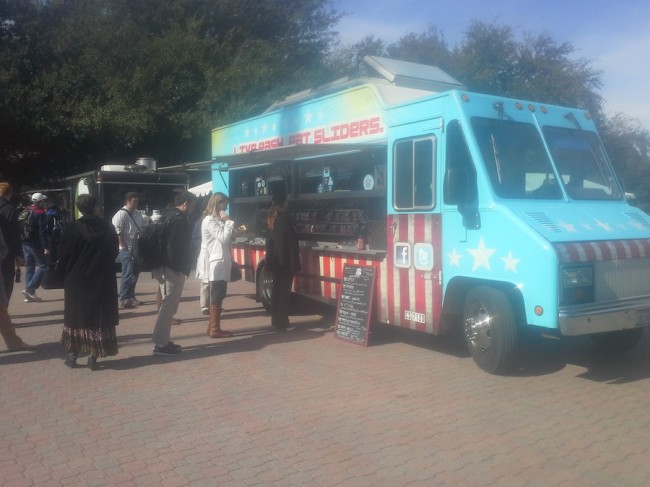Up until now, there has been two business models for food trucks: Either they begin as a restaurant and then branch out as a food truck or they start on wheels and stay on wheels.
Here in Dallas, a few food trucks are bucking these trends.
The owner of the food truck Cajun Tailgators is opening her first brick and mortar location with the same name later this month about half a year after the owners of the food truck Nammi opened their own restaurant.
“We got such a great response from our customers and we got asked many, many times a day, ‘Where is your restaurant?’” Ann Keady, owner of Cajun Tailgators, said. “We just had the food truck at the time. They wanted a place they could come regularly to eat. With the food truck, customers have to find us and see when we are near them. Opening the restaurant was just a natural progression.”
Keady’s permanent location in downtown Plano is set to open at the end of November. Keady noted that Cajun Tailgators was well suited to become a restaurant.
“I feel that our menu on the truck is better suited than other trucks due to the fact that we serve appetizers, entrees, and desserts: full menus,” Keady said. “There is also a lack of down-home, Cajun food restaurants in the Dallas area.”
One reason that owners of food trucks want to expand to restaurants is the number of restrictions put upon food trucks by the city of Dallas. For instance, a truck like Cajun Tailgators can be limited in the food that it serves by Dallas’ “Requirements for Mobile Food Vendors,” which states, “Only fast-cooked food items may be prepared on a mobile food preparation vehicle. Raw poultry or shellfish may be prepared on the vehicle only if it is frozen and breaded that goes directly from the freezer into a fryer.”
At a permanent location, such restrictions are lifted and Cajun Tailgators has the possibility of serving more seafood options.
Gary Torres and Teena Nguyen opened the permanent location for their truck Nammi this past August in Valley View, but they do things a little differently than Cajun Tailgators.
“When we took over our kitchen space at Valley View Mall for our prep location for our trucks, we noticed that there was a small space in front that we can use to test our items,” Torres said. “We call it a ‘Test Kitchen’ because it’s small and we have other food options that are not on the trucks.”
Torres warns that the transition to a restaurant can be difficult for owners of a food truck.
“I think just the transition for any truck to a ‘restaurant’ is a difficult task. We become very familiar with working on the truck,” Torres said. “The truck is such a close, tight area that has everything that you need at an arm’s length. Once you move to a larger space like a commercial kitchen, things tend to be a little farther out distance-wise. But, because of the size of the kitchen compared to the truck, we are able to expand our menu.”
The Green House Truck is opening the Green House Market this week at the nearby North Park Mall. This truck capitalized on the vegan and healthy foods trend and serves fresh salads, wraps, and other foods at their truck. The new restaurant, located next to the AMC movie theater in the mall, will have fresh produce and foods to buy as well as a sit-down area to enjoy pre-prepared foods.
The owners of Green House Truck could not be reached due to the opening of their location.
While the customers of Nammi, Green House Truck, and Cajun Tailgators have jumped at the idea of going to permanent locations, some food truck fans are not willing to do the same.
“I love to be in an outside environment and I can eat at food trucks really quickly,” Abdel Al-Twaijri, an SMU junior who frequents the food trucks at the flag pole every Tuesday and Thursday. “However, I would only go to the food truck because I want to be outside but if I’m going to eat at a restaurant I would rather eat somewhere else.”
Torres and Keady agree that not all trucks are capable of having permanent restaurants.
“I think we have done a good job establishing our name and brand with people in Dallas. As for being a model for other trucks to follow in to the restaurant business: I don’t think so,” Torres said. “Not all concepts are similar. Different concepts require different needs, hence our business model wouldn’t probably work.”
“Each individual truck is unique. Some would be great with a brick and mortar and some would be better to serve the public with the coolness of the food truck,” added Keady.









